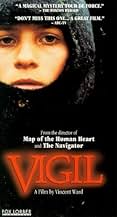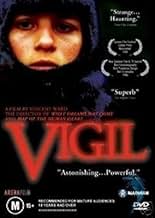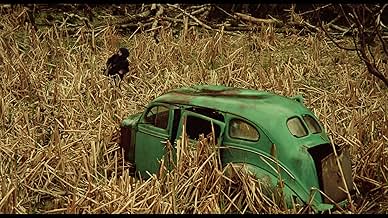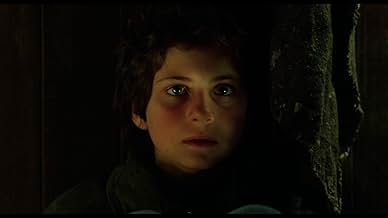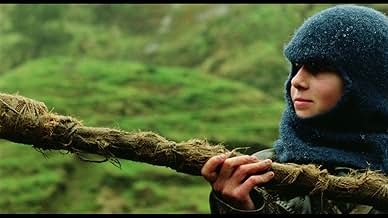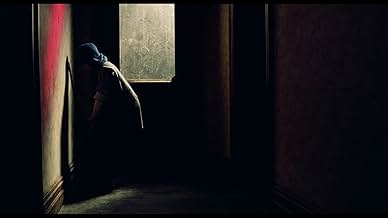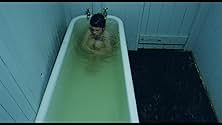Agrega una trama en tu idiomaA lonely girl living on an isolated, mist-cloaked farm is confronted with the changes wrought by a stranger that arrives.A lonely girl living on an isolated, mist-cloaked farm is confronted with the changes wrought by a stranger that arrives.A lonely girl living on an isolated, mist-cloaked farm is confronted with the changes wrought by a stranger that arrives.
- Dirección
- Guionistas
- Elenco
- Premios
- 3 premios ganados y 2 nominaciones en total
- Dirección
- Guionistas
- Todo el elenco y el equipo
- Producción, taquilla y más en IMDbPro
Opiniones destacadas
I grew up in the frames of "Vigil". Not to say that I was born in New Zealand - rather, I spent my early years in the lonely valleys and hillsides of Nova Scotia. But this film captures the desperate sense of isolation, the profound and perfect life buried beneath year after year of aching dreamtime, heartwaking nights beneath stars, mornings of fog that weigh you down with the power of all the heavens.
"Vigil" understands childhood. From the confusion of relationships, to the expression of emotion, the distance of adults, and the impetuosity and irrationality of youth. The wisdom of the young, held back without even the slightest consideration for right and wrong. The final answers to questions like "Why was I born?" and "Why am I me and not someone else?". The final answers that are really just acceptances. Eternal questions. For most of my life, since I was the very same age as the girl depicted in this story, I've been looking for a film that captured children as they really are, as they really behave, instead of just some adult's idea of how they act. This catches that elusive sense. For the first time, it puts me inside the childlike mind, lets me see through the same eyes that I once had. Unlike so many, I haven't forgotten what it was like to be this age, what it was really like. No other film understands childhood with such straight purity as this.
The sight of "Vigil" is like riding in a car with snowy windows. Like finding yourself in a poorly insulated house as the glass develops ice crystals and blurs your vision of the outside world. "Vigil" is life through a glass darkly. Alun Bollinger, the cinematographer, seems to see beyond the level of possibility. Beyond what naturalistic photography can conceivably capture. He takes the solid and safe and turns it deadly. Takes the inanimate and makes it breathe. It's as if horses were dreams and you find yourself riding nightmares in the pasture. It's dark and cold, yet full of life and light. Even the shadows tell of light. For if one is capable of perceiving the beauty of light, there is no end of it to be found in a film like "Vigil".
If a man like Vincent Ward had an achievement in life, a reason to be an artist, this film is that. He creates a tale of such perfection, such breath and personification, that I never realized how desperately I'd been searching my whole life for it to come around. With his co-writer, Graeme Tetley, a story of believability and human understanding has been woven together so tight, so pure, that I can't even speak of cinematic considerations. I can't think of undue questions or dissections. The reality is complete. For scene after scene, a solid image is perfectly presented, composed. Faces, houses, a derelict car, a jousting match. Nothing is weak. Nothing is unimportant.
This is the fifth film I've seen by Vincent Ward. One of them (What Dreams May Come) engaged me, but the visuals kept a distance. Two others (River Queen and Map of the Human Heart) were held back by unconvincing performances, though they were engaging otherwise. The Navigator, which he made four years later, is another truly great film - though of a much different style. But I'm not thinking of other films tonight. I'm dreaming of this world, and taking my vigil at the window. Tonight is calm, and the early Autumn air has settled outside my home in the Annapolis Valley. I'm thinking of the images I've seen, feeling changed and refocused, picked up out of my depression. This story has re-awoken the most desperate parts of my soul. It has left me with, to quote a song, "that grand dark feeling of emptiness".
For more of this feeling: Days of Heaven (1978), The Black Stallion (1979), Never Cry Wolf (1983), Tender Mercies (1983), The Stone Boy (1984), Ironweed (1987)
"Vigil" understands childhood. From the confusion of relationships, to the expression of emotion, the distance of adults, and the impetuosity and irrationality of youth. The wisdom of the young, held back without even the slightest consideration for right and wrong. The final answers to questions like "Why was I born?" and "Why am I me and not someone else?". The final answers that are really just acceptances. Eternal questions. For most of my life, since I was the very same age as the girl depicted in this story, I've been looking for a film that captured children as they really are, as they really behave, instead of just some adult's idea of how they act. This catches that elusive sense. For the first time, it puts me inside the childlike mind, lets me see through the same eyes that I once had. Unlike so many, I haven't forgotten what it was like to be this age, what it was really like. No other film understands childhood with such straight purity as this.
The sight of "Vigil" is like riding in a car with snowy windows. Like finding yourself in a poorly insulated house as the glass develops ice crystals and blurs your vision of the outside world. "Vigil" is life through a glass darkly. Alun Bollinger, the cinematographer, seems to see beyond the level of possibility. Beyond what naturalistic photography can conceivably capture. He takes the solid and safe and turns it deadly. Takes the inanimate and makes it breathe. It's as if horses were dreams and you find yourself riding nightmares in the pasture. It's dark and cold, yet full of life and light. Even the shadows tell of light. For if one is capable of perceiving the beauty of light, there is no end of it to be found in a film like "Vigil".
If a man like Vincent Ward had an achievement in life, a reason to be an artist, this film is that. He creates a tale of such perfection, such breath and personification, that I never realized how desperately I'd been searching my whole life for it to come around. With his co-writer, Graeme Tetley, a story of believability and human understanding has been woven together so tight, so pure, that I can't even speak of cinematic considerations. I can't think of undue questions or dissections. The reality is complete. For scene after scene, a solid image is perfectly presented, composed. Faces, houses, a derelict car, a jousting match. Nothing is weak. Nothing is unimportant.
This is the fifth film I've seen by Vincent Ward. One of them (What Dreams May Come) engaged me, but the visuals kept a distance. Two others (River Queen and Map of the Human Heart) were held back by unconvincing performances, though they were engaging otherwise. The Navigator, which he made four years later, is another truly great film - though of a much different style. But I'm not thinking of other films tonight. I'm dreaming of this world, and taking my vigil at the window. Tonight is calm, and the early Autumn air has settled outside my home in the Annapolis Valley. I'm thinking of the images I've seen, feeling changed and refocused, picked up out of my depression. This story has re-awoken the most desperate parts of my soul. It has left me with, to quote a song, "that grand dark feeling of emptiness".
For more of this feeling: Days of Heaven (1978), The Black Stallion (1979), Never Cry Wolf (1983), Tender Mercies (1983), The Stone Boy (1984), Ironweed (1987)
A young girl comes of age on a remote New Zealand farm, isolated deep inside a beautiful but forbidding landscape of windswept forests and mountains. Be forewarned: the film is no picturesque fable of adolescent angst, but a brooding, dreamlike story that occasionally slips into eerie, portentous lyricism. Shot in luminous verdant tones, the surrounding terrain is allowed to determine (some might say overwhelm) the scenario, putting it at the mercy of the impassive power of nature. Character and story development are nominal: after her father dies falling off a cliff, the young heroine watches a menacing, mysterious poacher arrive to help her widowed mother and crackpot grandfather, with his unexpected presence adding a subdued current of muted violence and sexuality to the already troubled household. It's a dark, claustrophobic little film, dramatically taciturn but visually impressive.
A slow-moving film, exquisitely shot, that to me is the best of pre-1990's New Zealand films. Mystical, magical, haunting, poetic, moody, moving...these words come to mind when trying to describe the film. Best images: Toss in the ballet tutu and gumboots; the unexpected spurt of blood on Toss's face when docking the lambs; Mum at the window; "Beans to God". Applause for script, cinematography, direction, and Fiona's remarkable performance as Toss.
At the starting scene of the movie, I did not know what to expect..as I continued to watching..I began to drawn to each character in their own way in the movie as in the connection between the mother, the grandfather, the poacher (the stranger).All together in one. But the real star in the story is TOSS- the little girl who witness her father's death. Throughout the whole movie, one begin to see how she is coping by her father's departure and somewhat feel alienated she wore an hawk-like hat to cover her face from the rest of the world ..and coming of age to discover who she really is and most of all the value of her womanhood.
The movie is a bit slow but it has a nice background based on its time, kinda bluish-gray mixing with different weathers during the scenes which made it magnificent and captivating to watch..Don't expect drama or actions..This movie is somewhat for the innocent. Just a feel-good movie. Go your nearest store; buy or rent it. You will enjoy it..
The movie is a bit slow but it has a nice background based on its time, kinda bluish-gray mixing with different weathers during the scenes which made it magnificent and captivating to watch..Don't expect drama or actions..This movie is somewhat for the innocent. Just a feel-good movie. Go your nearest store; buy or rent it. You will enjoy it..
Vincent Ward's work in this film reminded me of the use of images by Bergman in his early films. Rough country, silhouetted figures, unexpected angles and movement, an avoidance of bright colour.
We have to struggle to get to know the characters a little, and that is what I found was drawing myself in to the film. Ward could be accused of not telling the story fully enough. I found that his style kept me wondering what might happen next.
We have to struggle to get to know the characters a little, and that is what I found was drawing myself in to the film. Ward could be accused of not telling the story fully enough. I found that his style kept me wondering what might happen next.
¿Sabías que…?
- TriviaFirst ever film from New Zealand to be selected to screen in competition at the Cannes Film Festival.
- Citas
Ethan Ruir: What are you after?
Elizabeth Peers: I want you to keep your hands off my daughter.
Selecciones populares
Inicia sesión para calificar y agrega a la lista de videos para obtener recomendaciones personalizadas
- How long is Vigil?Con tecnología de Alexa
Detalles
- Fecha de lanzamiento
- País de origen
- Sitios oficiales
- Idioma
- También se conoce como
- Vigil - Zeit der Stürme
- Locaciones de filmación
- Productoras
- Ver más créditos de la compañía en IMDbPro
Contribuir a esta página
Sugiere una edición o agrega el contenido que falta

Principales brechas de datos
By what name was Vigil (1984) officially released in India in English?
Responda
